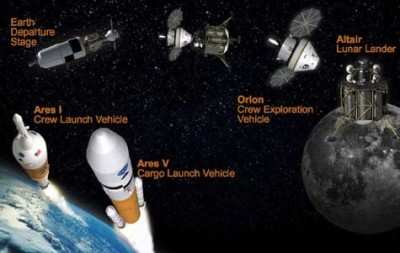Thu, May 27, 2010
CAGW Says It Represents "Old NASA"
 President George W. Bush initiated the Constellation program
with the goal of putting man back on the moon by 2020. The stated
goals were to gain significant experience in operating away from
Earth's environment, developing new technologies required for
exploring the solar system and conducting fundamental science. But
Citizens Against Government Waste (CAGW) says in a report released
Wednesday that the program is the latest in a series of troubled
post-Apollo human spaceflight programs within the U.S. space
agency, plagued by slipping deadlines and ballooning costs.
President George W. Bush initiated the Constellation program
with the goal of putting man back on the moon by 2020. The stated
goals were to gain significant experience in operating away from
Earth's environment, developing new technologies required for
exploring the solar system and conducting fundamental science. But
Citizens Against Government Waste (CAGW) says in a report released
Wednesday that the program is the latest in a series of troubled
post-Apollo human spaceflight programs within the U.S. space
agency, plagued by slipping deadlines and ballooning costs.
“As romantic and inspirational as space flight is, the
brutal reality is that the Constellation program has become a
symbol of the ‘old NASA,’” said CAGW President
Tom Schatz. “The program is morphing into another
ill-conceived government program suffering from all too familiar
runaway costs. The nation cannot continue to sink unlimited dollars
into this black hole.”
In 2006, the Government Accountability Office (GAO) estimated
that the total budget required for implementing the Constellation
Program (through initial lunar missions) was nearly $230 billion.
In 2009, the GAO concluded that “while the agency has already
obligated more than $10 billion in contracts, at this point NASA
does not know how much Ares I and Orion will ultimately cost, and
will not know until technical and design challenges have been
addressed.”

Constellation’s weaknesses have been extensively
documented by the Congressional Budget Office (CBO), the GAO, and
the Review of Human Spaceflight Plans Committee led by former
aerospace executive Norm Augustine. The CBO warned in April, 2009
that “if NASA’s funding was increased to about $21.1
billion annually, the agency would be able to meet its planned
schedules for the Constellation program even if cost growth was
consistent with the average for past programs. But that amount of
funding would not permit NASA to fly the space shuttle beyond 2010
or to support the space station beyond 2015. Moreover, under this
budgetary scenario, 15 of the planned science missions would be
delayed past 2025.”
Efforts to terminate this enormously wasteful and ineffective
program have encountered the usual congressional interference. Sen.
Richard Shelby (R-Ala.) has attached a congressional earmark for
Constellation to an emergency war funding bill that must pass
Congress this year.

“President Obama has taken a step in the right direction
by proposing to cancel the unsustainable Constellation Program in
favor of looking to increased reliance on the private sector and
investment in technologies that can lower the cost of human space
exploration,” concluded Schatz. “Congress should not
interfere with this objective.”
More News
Also: Netherlands Donates 18 F16s, 2 737s Collide On Ramp, E-7 Wedgetail Cut, AgEagle's 100th In S Korea The Pilot and Aircraft Privacy Act was introduced in the House by Represent>[...]
Pilot Also Reported That Due To A Fuel Leak, The Auxiliary Fuel Tanks Were Not Used On June 4, 2025, at 13:41 eastern daylight time, a Piper PA-23, N2109P, was substantially damage>[...]
Have A Story That NEEDS To Be Featured On Aero-News? Here’s How To Submit A Story To Our Team Some of the greatest new stories ANN has ever covered have been submitted by our>[...]
From 2023 (YouTube Edition): Reflections on War’s Collective Lessons and Cyclical Nature The exigencies of war ought be colorblind. Inane social-constructs the likes of racis>[...]
What Goes Around, May Yet Come Back Around, Klyde FMI: www.klydemorris.com>[...]
 Airborne 06.30.25: US v ADS-B Misuse, Natl STOL Fire, Volocopter Resumes
Airborne 06.30.25: US v ADS-B Misuse, Natl STOL Fire, Volocopter Resumes NTSB Prelim: Piper PA-23
NTSB Prelim: Piper PA-23 ANN FAQ: Submit a News Story!
ANN FAQ: Submit a News Story! Classic Aero-TV: One Mans Vietnam
Classic Aero-TV: One Mans Vietnam Klyde Morris (06.30.25)
Klyde Morris (06.30.25)





